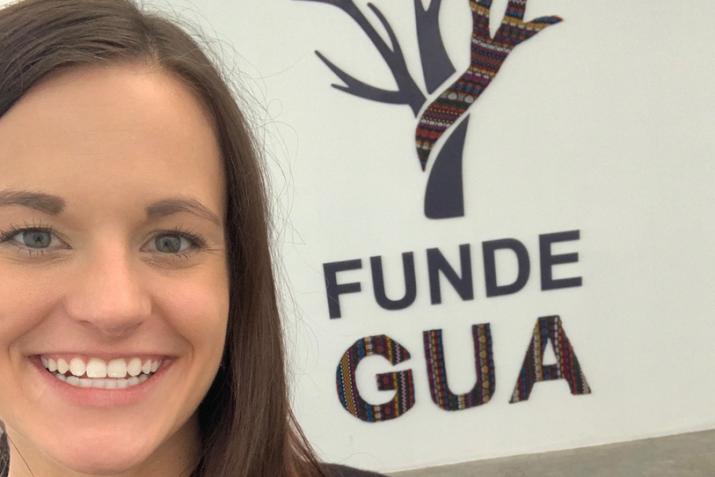
Kelsey Landrum stands in front of FUNDEGUA, one of the organizations that she and her research group collaborate with in Guatemala City. As part of her research, Landrum splits her time between hospitals and research centers, such as this.
Published August 5, 2019, last updated on April 7, 2020 under Voices of DGHI
Every summer, global health students at Duke University travel to countries around the world to do field research in a variety of topics within global health—including environmental health, women’s reproductive health, infectious disease, health policy and more.
DGHI caught up with Master of Science in Global Health student Kelsey Landrum to see what she’s been up to in Guatemala City, Guatemala. There, Landrum is conducting an economic analysis of universal health coverage (UHC) and other related health policy in the financing of pediatric surgery in Guatemala with Dr. Henry Rice, a pediatric surgeon at Duke University Hospital and a professor of surgery and global health at Duke.
DGHI: What inspired you to pursue THIS project?
Landrum: I was inspired to pursue this project, as I am interested in the intersections of epidemiology and economic policy, particularly in pediatric healthcare. Researching the financing of pediatric surgery and financial protection for pediatric surgical patients is critical to addressing pediatric surgical disease burden. As universal health coverage (UHC) and financial protection are increasingly being discussed at the global level, this is an important policy window to explore addressing surgical disease burden through UHC.
DGHI: What aspect of your fieldwork are you most excited about?
Landrum: I am most excited for the opportunity to learn from our colleagues in Guatemala. They are incredible role models in both clinical care and global health research, and it is an honor to be able to work with and learn from them.
DGHI: What’s the most interesting thing you’ve learned during your fieldwork so far?
Landrum: One very interesting topic that we are looking at is the presence of informal fees for pediatric surgical care. In theory, this care should be provided free of charge with current public health system policy. Even if the surgery itself is performed free of charge to the patient, families often incur the costs of medical supplies, donate blood and pay other “informal” fees to access surgery for their children. Simply looking at formal user fee and copayment financing mechanisms is not sufficient to address financial protection of pediatric surgical care.
DGHI: What’s one thing you’ve learned about the community/culture you’re in this summer?
Landrum: Everybody knows each other! This is a reminder of the importance of building strong, equitable and collaborative partnerships and friendships.
DGHI: What’s one thing you’ve learned in the field that you couldn’t have learned in the classroom?
Landrum: We are always told in the classroom to prepare for the unexpected as much as possible. As expected, very few things have actually gone as planned. Yet, this provides an incredible opportunity to learn how to solve problems quickly and creatively. Each obstacle is also an important learning opportunity.
DGHI: What’s the best piece of advice you got when preparing for your fieldwork?
Landrum: My mentor, Dr. Henry Rice, continually advises me to never forget why I am doing this work and to keep smiling even through difficult times. He reminds me of how important it is to always remember how special, and humbling, the opportunity to dedicate years of your life to studying something that you love is. I will always be grateful for the opportunity learn from my colleagues in the field and for this fieldwork experience. The advice to always return to these thoughts when challenges present themselves is so important.
DGHI: What’s the biggest (or most noteworthy) challenge you’ve overcome during your fieldwork? (include the challenge AND how you tackled it)
Landrum: I had to change part of my research project due to unforeseen events and challenges while in the field. The help of my mentor, Dr. Rice, as well as that of Dr. Melissa Watt, director of the Master of Science in Global Health Program, and the DGHI education team was absolutely critical to overcoming this challenge. With the hard work and dedication of this team, I was able to maintain a strong project that I am absolutely excited to be working on.


